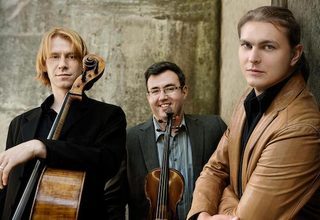|
Back
Send in the Clones New York
Morgan Library and Museum
05/17/2022 -
Horatio Parker: Suite for Piano Trio in A Major, Opus 35
Georgy Sviridov: Trio in A Minor, Opus 6
Sergei Rachmaninoff: “Elégiaque” Trio No. 1 in G minor – Vocalise, Opus 34, No. 14
Gaspar Cassadó: Piano Trio in C Major
Hermitage Piano Trio: Ilya Kazantsev (Piano), Misha Keylin (Violin), Sergey Antonov (Cello)

M. Keylin, S. Antonov, I. Kazantsev (© Lisa‑Marie Mazzucco)
“I went to New Haven and took the courses with Professor Horatio Parker. Parker was a composer and widely known, and my father was not a composer and little known–but from every standpoint I should say that my father was the greater man.”
Charles Ives
A rhetorical question? Why do the three Russian-American individual virtuosi of the Hermitage Piano Trio play a recital, three of whose four composers are apparently second‑rate?
Rhetorical since the names Sviridov and Cassadó have long been confined to tiny historical footnotes. The former one of the favored Stalin-Soviet composers, the latter a well‑known cellist but whose works are rarely played today.
Horatio Parker, whose Suite opened the program belongs to that long‑forgotten late 19th Century school of talented American writer-pianists who journeyed to the Central European Elysium forgetting that America had its own music. Parker’s major legacy was as teacher to that apotheosis of American music, Charles Ives. Ives, obviously , had little regard for Parker, though his contrapuntal extravagance used Parker’s more studious technique.
One virtue of such a program was to demonstrate that such a touching and vivacious trio like the Hermitage, can come close to placing a light (not radiant but illuminating) on these composers. The other virtue is that the unlikely names are frequently better than their reputations.
Horatio Parker’s opening piece was short and Suite. From the first lovely rolling piano by Ilya Kazantsev, one felt that the Brahms/Schumann mélange would be easy‑going, lithe, and abbreviated enough for a pleasant 20 minutes. In fact this was music where each of the three showed their soloistic and ensemble chops.
After all, it was little more than a “well‑made” composition. In fact, the Finale was rousing, enthusiastic and–had Parker injected a little Sousa or Stephen Foster–could have actually been called “American.”
The unknowns had two surprise virtues. Both Sviridov and Cassadó were not as good as their mentors. But within each performance, one caught glimpses of great genius.
Sviridov studied with Shostakovich, and this Piano Trio could well have been one of Shosty’s chamber works. It had all the ear marks: the doleful violin solos, the incessant col legno of both violin and cello, it has the usual Danse macabre. And this Trio was a mordant example of 20th Century Russian–not Soviet–legerdemain.
This is where one begins to think that the “Hermitage” Piano Trio was named after the St. Petersburg art museum! Both Misha Keylin’s violin and Sergey Antonov’s cello played with a hard Russian edge, with that schizoid sense of utter joy and boundless pathos. Was he really a favorite of Stalin’s? Maybe his film scores were less radical.
The most fascinating clone, though, was Gaspar Cassadó’s Piano Trio. The program notes show Cassadó coming from a highly musical family of piano, violin and (his own) cello. Moving to Paris–like Manuel de Falla–he wrote music which apparently (this was the only work I’d heard) was highly advanced, structured (like most music of that time in Paris), less organized, more fantasy.
But what a fantasy. Like parts of Falla, it was filled with Spanish harmonies, rhythms, colors. Nobody would call it Espanol: it showed the Hermitage Trio with another facet to their international reputation.
The two “familiar” works were by Rachmaninoff, played with deftness, a bit pathos and somehow, because they were familiar, less interest.
The “Elegiac” Trio timed at 45 minutes. The group played it with all the Rachmaninoff’s emblems, from a Dies Irae to the throbbing distillations of a typical finale.
The familiar Vocalise was arranged for trio. Its melody, its poignancy (on the cusp of pathos) and its brevity were welcomed here. And the Hermitage Piano Trio, though American residents for several decades, show their instinctive grasp of great 19th Century Russian emotion.
Harry Rolnick
|